Deborah Swift's Blog, page 10
May 31, 2023
The Devil’s Glove – two objects of inspiration and a clash of worlds #CoffeePotBookClub
I’m delighted to host a Guest Post by Lucretia Grindle, author of The Devil’s Glove today.
It’s always lovely to hear what inspired an author to tell a story.
Two Objects of Inspiration.
At its heart, The Devil’s Glove is a story about clashing worlds. The Native world and the Anglo-European world. The private world of The Hammonds and the social world beyond that judges them. The Old World of England, Jersey, and London and the New World of New England, Massachusetts, and The Eastward.
The nature of these places that form the lives of the central characters – the wild coast of Maine, where they must carve out a future, and the cosmopolitan world of England, and especially London, that not only contains their past, but is also the center of the trade they depend on – were central to how I thought about, and wrote, The Devil’s Glove. I was fascinated by how different they were, while at the same time being so deeply inter-linked. The two photos included here sat on my desk as I worked on the story, and were a constant source of inspiration.

I took this photograph on one of the many trips I made up and down the coast while I was working on the book. ‘Place’ has always been a central element, basically a character, in my writing. In The Devil’s Glove in particular, the coast of Maine is more than just a ‘setting’. It physically and emotionally forms what happens to and around the characters in the book. Obviously, the ocean dictates how they must live their lives. It terrifies, nurtures, protects and threatens them – and is also the primary route in and out of the Falmouth settlement. They can be saved, or attacked by water.
But that is only half of the coast. The other half is the forest that still covers so much of Maine today. To the Native tribes in particular, it is a sanctuary. To many of the villagers, it is an ominous presence – a dark and forbidding place that houses people and things that terrify them. Warriors burst without warning out of its depths. Captives disappear into it and are never seen again. Strange noises come from it. This is the wilderness their civilization must battle against.
Not so for Resolve and Deliverance Hammond. Nothing typifies their difference from the villagers in Falmouth quite as much as their attitude to, and relationship with, both the water and the forest. Resolve swims, and feels herself transforming, and connecting with another world. When she goes into the woods, she feels it close around her, cradling her – literally. This is ‘The Greening’ where she spent her childhood, the sanctuary that kept her and her mother safe.
For The Hammond women, crossing the cove is entering another world. Water takes them there, while the forest itself, once a classroom when they were sheltered by Ashawonks, is increasingly a source of power, and a portal – an entry point not only into the past, but also into the parallel Native world. One that could not be more removed, and yet is strangely linked to the second photograph I kept on my desk.
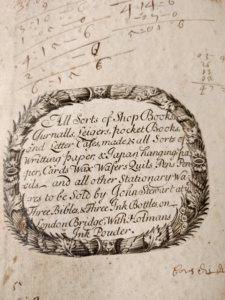
I found this scrap in a junk shop in London. The fact that it is dated from the same year The Devil’s Glove is set in made it a perfect juxtaposition to the still wild Maine coast. This lovely little piece of printing, with odd scraps of addition doodled around it, lists a sale of all sorts of things, including bibles and ink pots, letters cases cards and pens that are for sale in a shop on London Bridge.
Most of the things it lists have to do with literacy and writing which were central to the world of the late 17th century – and seem very far removed from the great forests of The Eastward, as Maine was known at the time. But were they? Yes, these are the emblems and tools of European ‘civilization’, but they are also the emblems, and tools, of trade.
‘Civilization’ as the Anglo-European immigrants who peopled 17th century New England conceived of it, was the anti-thesis of – and the thing that had to be imposed on – the vast, frightening wilderness they found themselves in. Yet, the raw goods of trade; furs, lumber, fish, came from that wilderness. Pens, letters cases, pocket books recorded and tracked that trade, which would also become the engine that powered and enabled that same ‘civilization’ to cross and re-cross the Atlantic, getting first a foothold, and then a grip on Maine’s rock-bound coast. And, eventually, even in her dense all-encompassing forests.
As I wrote The Devil’s Glove, I found these two photos represented the difference between the worlds the Hammond women inhabited, and their interdependence. Look at them one way, and they are completely opposed. Look at them again, and they are completely interlinked. The coast of Maine in 1688 is the future, while the Old World of London is the past. Or, those pens and pots of ink, those bibles are the wave of the future, set to crash into a Native past cradled by Maine’s forest and her sea.
Thank you Lucretia, for this fascinating post!
 Northern New England, summer, 1688.
Northern New England, summer, 1688.
Salem started here.
A suspicious death. A rumour of war. Whispers of witchcraft.
Perched on the brink of disaster, Resolve Hammond and her mother, Deliverance, struggle to survive in their isolated coastal village. They’re known as healers taught by the local tribes – and suspected of witchcraft by the local villagers.
Their precarious existence becomes even more chaotic when summoned to tend to a poisoned woman. As they uncover a web of dark secrets, rumors of war engulf the village, forcing the Hammonds to choose between loyalty to their native friends or the increasingly terrified settler community.
As Resolve is plagued by strange dreams, she questions everything she thought she knew – about her family, her closest friend, and even herself. If the truth comes to light, the repercussions will be felt far beyond the confines of this small settlement.
Based on meticulous research and inspired by the true story of the fear and suspicion that led to the Salem Witchcraft Trials, THE DEVIL’S GLOVE is a tale of betrayal, loyalty, and the power of secrets. Will Resolve be able to uncover the truth before the town tears itself apart, or will she become the next victim of the village’s dark and mysterious past?
Praise for The Devil’s Glove:
“From its opening lines this historical novel from Grindle (Villa Triste) grips with its rare blend of a powerfully evoked past, resonant characters, smart suspense, and prose touched with shivery poetry.” ~ BookLife Reviews Editor’s Pick
Buy the BookThis title is available to read on #KindleUnlimited.
Find Lucretia on her Website: http://LucretiaGrindle.com or Amazon Author Page: https://www.amazon.com/author/lucretiagrindle
The post The Devil’s Glove – two objects of inspiration and a clash of worlds #CoffeePotBookClub first appeared on Deborah Swift.May 16, 2023
Launch Day! The Silk Code by Deborah Swift #WW2 #HistoricalFiction #Englandspiel #Secret Agent
It’s out! I’m thrilled to launch The Silk Code today. The idea for this book was first mooted by the editor at HQ in February 2021, so it’s lovely to see it hit the virtual shelves. The audiobook will follow in about a week, and the paperback will be in bookshops in July. Meanwhile, the ebook is here! Thank you to everyone who pre-ordered, and all of my readers who support my books.
Thank you too to the fab team at HQDigital.
The Silk Code
‘The Silk Code had me absolutely hooked… A great storyline full of bravery, trust, love, survival, betrayal and determination.’ NetGalley reviewer, ⭐⭐⭐⭐⭐
Based on the true story of ‘Englandspiel’, one woman must race against the clock to uncover a traitor, even if it means losing the man she loves.
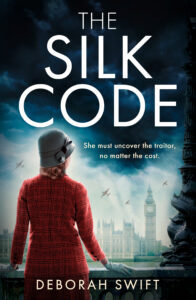
England, 1943
Deciding to throw herself into war work, Nancy Callaghan joins the Special Operations Executive in Baker Street. There, she begins solving ‘indecipherables’ – scrambled messages from agents in the field.
Then Nancy meets Tom Lockwood, a quiet genius when it comes to coding. Together they come up with the idea of printing codes on silk, so agents can hide them in their clothing to avoid detection by the enemy. Nancy and Tom grow close, and soon she is hopelessly in love.
But there is a traitor in Baker Street, and suspicions turn towards Tom. When Nancy is asked to spy on Tom, she must make the ultimate sacrifice and complete a near-impossible mission. Could the man she loves be the enemy?
Buy The Silk CodeThe paperback and audiobook are coming soon.
The post Launch Day! The Silk Code by Deborah Swift #WW2 #HistoricalFiction #Englandspiel #Secret Agent first appeared on Deborah Swift.
May 11, 2023
The Queen’s Scribe by Amy Maroney @wilaroney #Review #HistoricalFiction #TheQueensScribe #TheCoffeePotBookClub
Review – The Queen’s Scribe
This is the third book in the series and I’ve read all three, as well as the author’s previous books, so you can tell I’m a fan! This is a fabulous evocation of a forgotten place and a forgotten era, and Estelle, the main character, is brave, resourceful and intelligent. Sent by her father to the court in Cyprus, she soon realises she has been dropped into a nest of vipers, and must use her wits to survive all the machinations of the court. Jacco, the bastard son, is intent on becoming ruler, and overthrowing the Queen’s rule. At first the Queen is reluctant to trust Estelle as her view of her has been poisoned, but through her knowledge of French and her ability to translate between the Queen ad her French husband, Estelle slowly wins her round. Not only that, but the friendship between the women gives the Queen the confidence to follow her own heart and mind.
As well as a hostile court, Estelle has to navigate an unwanted suitor, and the war that will surely come. In amongst all the skulduggery is a romance between Estelle and Gabriel, who is a falconer and a man of wisdom. At first mistrustful of each other, they are nevertheless drawn together and the reader is rooting for them all the way.
There is a lot going on in this book! Hidden treasure, a castle siege, and plenty of enemies. If you like a story which transports you to another era, but also keeps you nailed to the adventure, this is the book for you. Highly recommended.
ABOUT THE BOOK
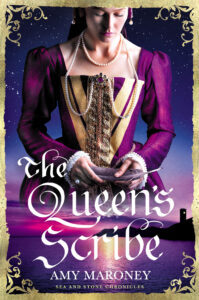 A broken promise. A bitter conflict.
A broken promise. A bitter conflict.
And a woman’s elusive chance to love or die.
1458
Young Frenchwoman Estelle de Montavon sails to Cyprus imagining a bright future as tutor to a princess. Instead, she is betrayed by those she loves most and forced into a dangerous new world of scheming courtiers, vicious power struggles, and the terrifying threat of war.
Determined to flee, Estelle enlists the help of an attractive and mysterious falconer. But on the eve of her escape, fortune’s wheel turns again. She gains entry to Queen Charlotta’s inner circle as a trusted scribe and interpreter, fighting her way to dizzying heights of influence.
Enemies old and new rise from the shadows as Estelle navigates a royal game of cat and mouse between the queen and her powerful half-brother, who wants the throne for himself.
When war comes to the island, Estelle faces a brutal reckoning for her loyalty to the queen. Will the impossible choice looming ahead be her doom—or her salvation?
With this richly-told story of courage, loyalty, and the sustaining power of love, Amy Maroney brings a mesmerizing and forgotten world to vivid life. The Queen’s Scribe is a stand-alone novel in the Sea and Stone Chronicles collection.
Praise for the Sea and Stone Chronicles:
“Island of Gold is a nimbly told story with impeccable pacing.”
—Historical Novel Society, Editor’s Choice Review
“Sea of Shadows is stunning. A compelling tale of love, honor, and conviction.”
—Reader’s Favorite Review
Amy Maroney is the author of the award-winning Miramonde Series, the story of a Renaissance-era female artist and the modern day scholar on her trail.
This title is available to read on #KindleUnlimited.
Universal Link https://mybook.to/QueensScribe
Author Bio:
Amy Maroney studied English Literature at Boston University and worked for many years as a writer and editor of nonfiction. She lives in Oregon, U.S.A. with her family. When she’s not diving down research rabbit holes, she enjoys hiking, dancing, traveling, and reading.
Amy is the author of The Miramonde Series, an Amazon-bestselling historical mystery trilogy about a Renaissance-era female artist and the modern-day scholar on her trail. Amy’s award-winning historical adventure/romance series, Sea and Stone Chronicles, is set in medieval Rhodes and Cyprus.
An enthusiastic advocate for independent publishing, Amy is a member of the Alliance of Independent Authors and the Historical Novel Society.

Find Amy : Website: https://www.amymaroney.com/
Twitter: https://twitter.com/wilaroney
Facebook: https://www.facebook.com/amymaroneyauthor
The post The Queen’s Scribe by Amy Maroney @wilaroney #Review #HistoricalFiction #TheQueensScribe #TheCoffeePotBookClub first appeared on Deborah Swift.
April 26, 2023
A Matter of Faith by Judith Arnopp #Review #CoffeePotBookClub
A Matter of Faith: Henry VIII, the Days of the Phoenix by Judith Arnopp
About the book:
Finally free of Catherine of Aragon, Henry VIII, is now married to Anne Boleyn and eagerly awaiting the birth of his son. In a court still reeling from the royal divorce and growing public resentment against church reform, Henry must negotiate widespread resentment toward Anne. He places all his hopes in a son to cement his Tudor blood line, but his dreams are shattered when Anne is delivered of a daughter.
Burying his disappointment, Henry focuses on getting her with child again, but their marriage is volatile and as Henry faces personal bereavement, and discord at court, Anne’s enemies are gathering. When the queen miscarries of a son, and Henry suffers a life-threatening accident, his need for an heir becomes critical. Waiting in the wings is Jane Seymour, a lady-in-waiting who offers the king comfort and respite from Anne’s fiery passions.
But, when Anne falls foul of her former ally, Thomas Cromwell, and the king is persuaded he has been made a cuckold, Henry strikes out and the queen falls beneath the executioner’s sword, taking key players in Henry’s household with her.
Jane Seymour, stepping up to replace the fallen queen, quickly becomes pregnant. Delighted with his dull but fertile wife, Henry’s spirits rise even further when the prince is born safely. At last, Henry has all he desires but even as he celebrates, fate is preparing to deliver one more staggering blow.
Henry, the once perfect Renaissance prince, is now a damaged middle-aged man, disappointed in those around him but most of all in himself. As the king’s optimism diminishes, his intractability increases, and the wounded lion begins to roar.

This title is available to read on #KindleUnlimited.
REVIEW
I have read the first book in this series and loved the portrait of the young Henry VIII. In this novel he is older, but it seems, not wiser! We are taken into the head of this monarch and although it can never be a true representation of the complexity of this man, Judith Arnopp manages to bring about a consistency that brings him to life on the page. His hopes, fears and dreams – all of which seem likely considering what we know of the history, are brought to the fore in the way only a novel can portray.
We have all seen films of Henry VIII, of his awful actions in his own court, of his bullying and cajoling to get what he wants. What is great in this novel is that we see also his insecurities – his longing for an heir, his hopes for Anne, his devastation at the loss of his sister Mary, and the eventual tragedy that befalls him, the church and the hapless Anne Boleyn, whose only crime was not to produce the required son. How he becomes the narcissistic and controlling megalomaniac that he eventually becomes, is tempered with his inner doubts. He knows he is bad, but is too selfish to remedy it.
Cromwell’s hand in Anne’s demise is subtly drawn, and the way Henry lurches afterwards to Jane Seymour is credible, as Jane seems to be able to put aside her personality do his bidding — the opposite of Anne who made him wait before she would marry him. It is a story nearly everyone knows – the story of Henry and his wives, yet this is so fresh, to feel his story from the inside.
Congratulations to Judith Arnopp – massively entertaining and a superbly inventive insight into the mind of one of our most famous monarchs.
Vey highly recommended for all Tudor fans.
Get it HERE: Universal Link: http://mybook.to/amofaith
Judith’s next non-fiction book coming soon: How to Dress like a Tudor will be published by Pen & Sword in 2023.
Get in touch with Judith: Website: Twitter: Facebook:
The post A Matter of Faith by Judith Arnopp #Review #CoffeePotBookClub first appeared on Deborah Swift.April 12, 2023
The Kingmaking by Helen Hollick – 30 years old! Plus a birthday celebration @cathiedunn #CoffeePotBookClub
Huge Congratulations to Helen Hollick on her Special 30th Publication Anniversary and 70th Birthday Celebration!
Series: The Pendragon’s Banner Trilogy (Book #1)
The Kingmaking: Book One
Pendragon’s Banner: Book Two
Shadow of the King: Book Three
 THE KINGMAKING
THE KINGMAKING
The Boy Who became a Man:
Who became a King:
Who became a Legend… KING ARTHUR
There is no Merlin, no sword in the stone, and no Lancelot.
Instead, the man who became our most enduring hero.
All knew the oath of allegiance:
‘To you, lord, I give my sword and shield, my heart and soul. To you, my Lord Pendragon, I give my life, to command as you will.’
This is the tale of Arthur made flesh and bone. Of the shaping of the man who became the legendary king; a man with dreams, ambitions and human flaws.
A man, a warlord, who united the collapsing province of post-Roman Britain, who held the heart of the love of his life, Gwenhwyfar – and who emerged as the most enduring hero of all time.
A different telling of the later Medieval tales.
This is the story of King Arthur as it might have really happened…
(contains scenes of an adult nature)
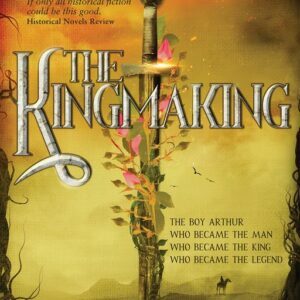 “If only all historical fiction could be this good.” Historical Novels Review
“If only all historical fiction could be this good.” Historical Novels Review
“… Juggles a large cast of characters and a bloody, tangled plot with great skill. ” Publishers Weekly
“Hollick’s writing is one of the best I’ve come across – her descriptions are so vivid it seems as if there’s a movie screen in front of you, playing out the scenes.” Passages To The Past
“Hollick adds her own unique twists and turns to the familiar mythology” Booklist
“Uniquely compelling… bound to have a lasting and resounding impact on Arthurian literature.” Books Magazine
The Kingmaking is available to read on #KindleUnlimited.
BUY THE BOOK https://mybook.to/TheKingmaking_Book1
About Helen Hollick
 Helen is celebrating her 70th birthday and thirty years as a published author. Her Pendragon’s Banner Trilogy, a fifth-century version of the Arthurian legend, was accepted for traditional publication in April 1993 by William Heinemann (Random House UK) a week after her 40th birthday. The Trilogy has been widely acclaimed since then – and gone through several different editions.
Helen is celebrating her 70th birthday and thirty years as a published author. Her Pendragon’s Banner Trilogy, a fifth-century version of the Arthurian legend, was accepted for traditional publication in April 1993 by William Heinemann (Random House UK) a week after her 40th birthday. The Trilogy has been widely acclaimed since then – and gone through several different editions.
Helen moved from Random House UK in 2006 and went ‘Indie’, now in 2023 to celebrate she has brought out her own fabulous new editions! (The Trilogy is published mainstream by Sourcebooks Inc in USA/Canada. The publisher was offered the new cover designs for free, but declined.)
Helen became a USA Today Bestseller with her historical novel, The Forever Queen (titled A Hollow Crown in the UK) with the sequel, Harold the King (US: I Am The Chosen King) being novels that explore the events that led to the Battle of Hastings in 1066.
She writes a nautical adventure/fantasy Pirates of the Caribbean series, The Sea Witch Voyages and has also branched out into the quick read novella, ‘Cosy Mystery’ genre with her Jan Christopher Murder Mysteries, set in the 1970s, with the first in the series, A Mirror Murder incorporating her, often hilarious, memories of working as a library assistant.
Her non-fiction books are Pirates: Truth and Tales and Life of A Smuggler. She lives with her family in an eighteenth-century farmhouse in North Devon with a variety of pets and horses.
Find Helen on Social Media: Website: https://helenhollick.net Twitter: https://twitter.com/HelenHollick Facebook: https://www.facebook.com/helen.hollick
The post The Kingmaking by Helen Hollick – 30 years old! Plus a birthday celebration @cathiedunn #CoffeePotBookClub first appeared on Deborah Swift.April 4, 2023
Pagan Warrior by M J Porter – how do we know about the 7th Century? #coloursofunison #coffeepotbookclub
I’m thrilled to host M J Porter on my blog today with her new book Pagan Warrior and a fascinating guest post.
How do we know what we know about the seventh century?
There’s no way of truly knowing what transpired over 1400 years ago when the events on which I based the Gods and Kings trilogy, which begins with Pagan Warrior, took place. There are three main sources from this period which can be used. The first near-contemporary source available to the modern scholar is that of Bede in his The Ecclesiastical History of the English People, completed in c.731. The events that he recorded of the people and battles from 632/3 to 655 mean that even he is removed from the immediacy of what truly happened by up to a century. He was also a Northumbrian Christian monk writing about events before Saxon England was truly converted to Roman Christianity and trying to prove that only through God’s might could kings rule well.
The manuscript tradition of the surviving source material highlights another problem. We don’t have the original manuscript, written in Bede’s hand, to know exactly what he wrote. Our earliest surviving manuscript, known as Tiberius Bede, and held by the British Library, dates to around 737, so after Bede’s death, which is said to have occurred in 735.
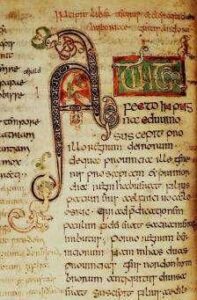 The manuscript can be viewed online here https://www.bl.uk/collection-items/bedes-ecclesiastical-history-of-the-english-people, and it is a beautiful manuscript.
The manuscript can be viewed online here https://www.bl.uk/collection-items/bedes-ecclesiastical-history-of-the-english-people, and it is a beautiful manuscript.
While Bede’s work was copied copiously during the Saxon era, each of these editions was an opportunity to edit or add or purposefully omit as the scribes went along. Historians have spent much time trying to devise the manuscript traditions that link one surviving text to another.
This problem isn’t restricted to Bede, but applies to all the source material written about the events of the seventh century. Not just Bede but also the Historia Brittonum, once assigned to Nennius. This provides information about the seventh century but is a later source, dated to the ninth century and only surviving in eleventh-century copies. It’s believed to be a British, or rather Welsh, account of events. It’s particularly well-known as a basis for much of the later Arthurian legend.
One of the versions, the earliest one that survives, can be viewed here https://www.bl.uk/manuscripts/FullDisplay.aspx?ref=Harley_MS_3859
Our third near-contemporary source, The Anglo-Saxon Chronicle, was devised at the court of King Alfred of Wessex at some point before c.890. It, too, has a rich and varied manuscript tradition and survives in nine recensions, the earliest of which dates to the early eleventh century.
It can be viewed online via The Parker Library on the Web, https://parker.stanford.edu/parker/catalog/wp146tq7625
The Anglo-Saxon Chronicle has a particularly complex history. It was first written utilising the words of Bede and possibly other, now lost, sources. It was also written even more distanced in time than Bede, and it has certainly been subject to additions and omissions throughout its history. For many years, attempts were made to incorporate all of the different recensions to provide a ‘rounded history’ of the period. However, the intricacies of the individual recensions are now appreciated, and instead, modern editors look for the reasons for these omissions and additions.
These various sources, written in Latin, or Old English, have been the subject of many studies, and of course, modern editions are available to read in English. But again, this is just another means by which the modern scholar is distanced from the intent and meaning of the original words. The modern scholar is far removed from the words devised by the religious men (but possibly also the religious women) who first put quill to vellum to offer a record of times before they lived.
Those writing of the period need to be aware of these limitations and restrictions, while an audience needs to appreciate that there are almost no definites. In many ways, our history of the period is entirely skewed by what others thought. It’s a sobering realisation.
From bestselling author, MJ Porter comes the tale of the mighty pagan king, Penda of Mercia.
Britain. AD 632.
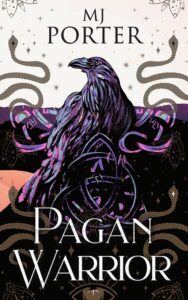
Penda, a warrior of immense renown, has much to prove if he is to rule the Mercian kingdom of his dead father and prevent the neighbouring king of Northumbria from claiming it. Unexpectedly allying with the British kings, Penda races to battle the alliance of the Northumbrian king, unsure if his brother stands with him or against him as they seek battle glory for themselves, and the right to rule gained through bloody conquest. There will be a victor and a bloody loser, and a king will rise from the ashes of the great and terrible battle of Hædfeld.
Audiobook narrated by Matt Coles
BUY HERE :books2read.com/PaganWarrior
Image The Tiberius Bede – Tiberius Bede, Public domain, via Wikimedia Commons
#Audiobook narrated by Matt Coles
MJ Porter is the author of many historical novels set predominantly in Seventh to Eleventh-Century England, as well as three twentieth-century mysteries. Being raised in the shadow of a building that was believed to house the bones of long-dead Kings of Mercia, meant that the author’s writing destiny was set.
Get in touch via M J’s Social Media Links:
Website: www.mjporterauthor.blog Twitter: https://twitter.com/coloursofunison Facebook: https://www.facebook.com/mjporterauthor
The post Pagan Warrior by M J Porter – how do we know about the 7th Century? #coloursofunison #coffeepotbookclub first appeared on Deborah Swift.March 6, 2023
The Venice Secret by Anita Chapman Featured #NewRelease #Venice #DualTimeline
About The Venice Secret:
One hidden painting. Two women born centuries apart. A secret uncovered.
In 2019, Rachel is stuck in a rut when she discovers what appears to be a Canaletto painting in her
grandmother’s loft along with a note addressed to Philippa in 1782. With help from Jake at the local
art gallery, Rachel endeavours to find out if the painting is an original and uncovers a secret from the past.
In 1780, governess at Chipford Hall, Philippa is offered the role of mistress by Earl Rupert. She
escapes to Venice as companion to bluestocking, Lady Cordelia who reveals a secret that changes
both their lives. They do their best to keep the secret from Lady Cordelia’s social circle, but their
nemesis is determined to reveal all and ruin them.
About Anita Chapman
Anita Chapman enjoyed writing stories from a young age, and won a local writing competition when she was nine years old. Encouraged by this, she typed up a series of stories about a mouse on her mum’s typewriter and sent them to Ladybird. She received a polite rejection letter, her first. Many of Anita’s summers growing up were spent with her family driving to Italy, and she went on to study French and Italian at university. As part of her degree, Anita lived in Siena for several months where she studied and au paired, and she spent a lot of time travelling around Italy in her twenties. Anita likes to read journals and diaries from the past, and one of her favourite pastimes is visiting art galleries and country houses. Her first published novel, The Venice Secret is inspired by her mother taking her to see the Canalettos at The National Gallery in London as a child. Since 2015, Anita has worked as a social media manager, training authors on social media, and helping to promote their books. She’s run several courses in London and York, and has worked as a tutor at Richmond and Hillcroft Adult Community College.
BUY THE BOOK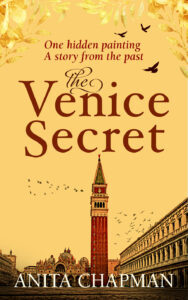 Connect with Anita
Connect with Anita
Website:
Twitter: @neetschapman
Facebook Page: Anita Chapman Author
Instagram: @neetschapman
TikTok: @neetschapman
February 26, 2023
The Scots of Dalriada by Rowena Kinread #Scotland #History #CoffeePotBookClub
 About the Book
About the Book
Fergus, Loarn and Angus, Princes of the Dalriada, are forced into exile by their scheming half-brother and the druidess Birga One-tooth.
THREE FATES
Fergus conceals himself as a stable lad on Aran and falls helplessly in love with a Scottish princess, already promised to someone else. Loarn crosses swords against the Picts. Angus designs longboats.
TOGETHER A MIGHTY POWER
Always on the run the brothers must attempt to outride their adversaries by gaining power themselves. Together they achieve more than they could possibly dream of.
Fergus Mór (The Great) is widely recognised as the first King of Scotland, giving Scotland its name and its language. Rulers of Scotland and England from Kenneth mac Alpín until the present time claim descent from Fergus Mór.
Full of unexpected twists and turns, this is a tale of heart-breaking love amidst treachery, deceit and murder.
Review
I bought this book on #KindleUnlimited and admit I knew nothing about early Scottish or Irish history, so this was really interesting. It is not for the faint-hearted as early on in the book it contains the sort of sex and violence you might expect from warring tribes of this era. Hand to hand fighting with sword and fists is a very different battlefield to that of today. Don’t let this put you off though, as it is extremely well-researched with episodes covering a vast swathe of history. The sort of hand to mouth existence is well-described, the flat-bottomed boats, the reliance on horses, the language of Brittonic, the burns and brochs, the rocks and seashore. I loved the travel between Scotland and Ireland, and the description of life in the Irish fort at Tara, Meath.
I enjoyed Fergus’ character as he grows and develops. The characters are rough men, used to fighting, manipulating, wielding threats and death to those that cross them. Erc was a great character – he dispenses the wisdom born of age, and came across as hard-headed but realistic. ‘If you receive favours instead of being a leader by merit, then your men will not trust you wholly, nor follow you blindly’.
There is a lot in this novel and you have to keep your wits about you as a reader as it zips from place to place. Rowena Kinread’s love of the history of these people shines through and for anyone interested in their Scottish or Irish origins, or early Christian and Druid history, it is a must read.
The post The Scots of Dalriada by Rowena Kinread #Scotland #History #CoffeePotBookClub first appeared on Deborah Swift.February 22, 2023
The Flying Scotsman Sings by Debbie Wastling #NewRelease #Railways #FlyingScotsman
 New Release!
New Release!
Congratulations to Debbie Wastling on the launch of The Flying Scotsman Sings.
Why today? This is the day the train went first into service from Doncaster with the newly formed London and North Eastern Railway.
In 2023 the train will tour the UK it all its steam (and electric) glory. If you live in the UK or want a trip on this magnificent train, which was driven by Debbie’s grandfather, you can find out more here. https://www.railwaytouring.net/the-edinburgh-flyer-2023.
For more information on the book, contact Debbie
The post The Flying Scotsman Sings by Debbie Wastling #NewRelease #Railways #FlyingScotsman first appeared on Deborah Swift.February 21, 2023
The Black Madonna by Stella Riley – Excerpt #CoffeePotBookClub @RileyStella
I am thrilled to welcome Stella Riley today with an Excerpt from The Black Madonna, Book 1 in the Roundheads and Cavaliers Series.
ABOUT THE BOOK: As England slides into Civil War, master-goldsmith and money-lender, Luciano Falcieri del Santi embarks on his own hidden agenda. A chance meeting one dark night results in an unlikely friendship with Member of Parliament, Richard Maxwell. Richard’s daughter, Kate – a spirited girl who vows to hold their home against both Cavalier and Roundhead – soon finds herself fighting an involuntary attraction to the clever, magnetic and diabolically beautiful Italian.
Hampered by the warring English, his quest growing daily more dangerous, Luciano begins to realise that his own life and that of everyone close to him rests on the knife-edge of success … for only success will permit him to reclaim the Black Madonna and offer his heart to the girl he loves.
From the machinations within Parliament to the last days of the King’s cause, The Black Madonna is an epic saga of passion and intrigue at a time when England was lost in a dark and bloody conflict.
BUY THE BOOK Universal Buy Link: https://books2read.com/u/bPNKpd
EXCERPT
The start of Luciano’s quest and the significance of the black Madonna.
Vittorio scowled at him. ‘What makes you think I’d lend you the price of a hair-cut – let alone a sum of this size?’
‘Because you know I don’t fail,’ said the distant voice simply.
This was too much for his cousins. Carlo and Giuseppe burst into a torrent of impassioned speech and young Mario – who alone of the three had been born with a sense of humour – gave a long appreciative whistle. Then Carlo’s voice emerged triumphant.
‘Arrogant upstart!’ he spat. ‘You’ve already wormed your way far enough into this family’s intimate concerns to learn financial details that even I – the eldest son – don’t know!’
The ghost of a sardonic smile touched the lean mouth but its owner said nothing.
It was left to Vittorio to observe that, if Carlo had any interest in finance beyond having sufficient money to entertain his fine friends, it was the first he’d heard of it. Then, bidding him be silent or get out, he looked back at his nephew and said slowly, ‘Now, Luciano … let us know what we say. You are asking for a family favour? A massive loan on no better security than my faith in your abilities?’
‘Not at all,’ came the cool reply. ‘I am asking you to advance me fifty thousand in gold for a period of ten years, at a rate of interest in accordance with your normal transactions and to be repaid annually. Should I fail to meet this obligation, you are entitled to terminate our agreement and reclaim the whole. As to the matter of security …’ He paused and, moving for the first time, produced from the folds of his cloak a narrow, irregular-shaped package. ‘For security, I offer you this.’
Giuseppe looked up from buffing his fingernails long enough to snigger.
Carlo said derisively, ‘Some bauble you won in a dice game?’
With the same unshakeable impassivity that had maddened Carlo for eight years, Luciano ignored him and crossed the room to lay the parcel before his uncle. ‘I understand that you once held this in some esteem … but perhaps you no longer care to have it.’
Vittorio reached out a hand but, even before he touched the package, knowledge of its contents rushed in upon him and he said hoarsely, ‘You – you have it still?’
‘Of course.’ A vagrant smile flickered across the remote, finely-boned face. ‘Did you never suspect it?’
Without seeming to be aware of what he was doing, Vittorio rose from his chair saying, ‘You said everything was put under seal – confiscated by the English Crown. The house, land, money, papers … everything. I thought that this, too –’ He broke off, a surge of colour staining his skin. ‘You deceived me!’
‘No. You deceived yourself.’
The admission implicit in this speech caused Vittorio’s flush to assume choleric proportions and prompted sixteen-year-old Mario to say quickly, ‘Father? Won’t you open the packet?’
‘Yes,’ drawled Carlo. ‘By all means let us see if what our dear cousin offers us against several years’ profit is worth it.’
There was a long pause and then Vittorio said quietly, ‘It is worth it – and your cousin knows it very well. He has brought the Black Madonna home.’
The effect of this announcement on Carlo and Giuseppe was not prodigious but Mario said eagerly, ‘The Madonna? Truly? May we see it?’
And finally, with an odd reluctance, Vittorio sank back into his chair and, taking the parcel between his hands, slowly unwrapped it.
The Madonna was not large – nor did it possess any obvious feature to suggest that it was, in fact, a Madonna at all. There was no enamelling, no gilding, no jewels; only the slender form of a young girl, simply fashioned of dark, red-veined obsidian. Her hair was demurely covered, her hands clasped in the folds of her robe and her mouth curved in a sweet, secret smile.
For the first time in twenty years, Vittorio’s eyes caressed the smooth glossy surface of the stone and marvelled afresh at the mystery of it. He was not a sentimental man and nowadays he had a house full of beautiful, expensive things; but not one of them held a fragment of the lure contained in this austere and probably valueless piece.
All he knew of the lady was that she had been in his family for generations and had been treasured through years of obscurity and squalor since before the Falcieri had left their native village of Santi. He had been bred to revere her – as had his brother, Alessandro. But Alessandro had stolen her and, in doing so, brought about his own destruction. Or so Vittorio thought. Yet the wheel of Fate had ground on … and the Madonna was home at last.
‘Is that it?’ Carlo shattered the silence with three supremely disparaging syllables. ‘How dreary! It’s no more than a crudely-worked lump of stone.’
Vittorio came to his feet with a force that sent his chair grating back across the floor. For a long moment Carlo was subjected to a wave of intense, silent fury. Then, sweeping round to face his nephew, Vittorio said, ‘And you? Do you see only a lump of stone?’
‘No.’ Luciano looked on the Madonna with hooded eyes. ‘I see something which, once lost, I can never replace.’
Some of the wrath left Vittorio’s face and he growled, ‘Then you’d better be sure of what you do.’
‘I am sure. I’ve had eight years in which to plan it.’
‘And?’
‘And I propose, signor, that we gamble.’ Again that chilly, impersonal smile. ‘You hold the Madonna and advance me the money. If I use it successfully, you regain it in full and with interest – but return the lady. If not, you take what I have and keep her. Either way, you can’t lose.’
‘Very clever.’
‘Not particularly. It’s my only option.’
Unexpectedly, Vittorio laughed.
‘You don’t favour your father, do you? He hadn’t a calculating bone in his body.’
Luciano replied with the merest suggestion of a shrug, a gesture he rarely permitted himself because it emphasised the slight irregularity of his left shoulder. He said merely, ‘I have read Il Principe.’
‘Machiavelli? Yes. You would. But there’s more to this than a desire for your own enterprise. What is it? A girl?’
The dark, cobalt gaze filled with derision. ‘Hardly.’
‘Then what? I think I’ve a right to know what my money will be buying.’
It was a long time before Luciano spoke and, when he did, each word arrived sheathed in ice.
‘It will be buying justice, signor. I’m surprised that you needed to ask.’
‘Justice? From the English? After so long?’ Vittorio snorted. ‘You have no hope.’
‘Perhaps. Perhaps not.’ Another pause, and then, ‘But fortunately, if justice fails, one may look for revenge.’
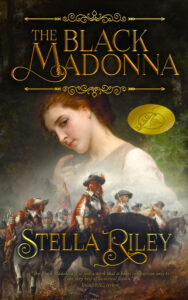 KEEP READING! BUY THE BOOK. https://books2read.com/u/bPNKpd
KEEP READING! BUY THE BOOK. https://books2read.com/u/bPNKpd
About Stella Riley
Winner of three gold medals for historical romance (Readers’ Favourite in 2019, Book Excellence Awards in 2020, Global Book Awards in 2022) and fourteen B.R.A.G. Medallions, Stella Riley lives in the beautiful medieval town of Sandwich in Kent.
She is fascinated by the English Civil Wars and has written six books set in that period. These, like the seven-book Rockliffe series (recommended in The Times newspaper!) and the Brandon Brothers trilogy, are all available in audio, narrated by Alex Wyndham.
Stella enjoys travel, reading, theatre, Baroque music and playing the harpsichord. She also has a fondness for men with long hair – hence her 17th and 18th century heroes.
Website: https://stellarileybooks.co.uk Twitter: https://twitter.com/RileyStella
[image error]
The post The Black Madonna by Stella Riley – Excerpt #CoffeePotBookClub @RileyStella first appeared on Deborah Swift.



